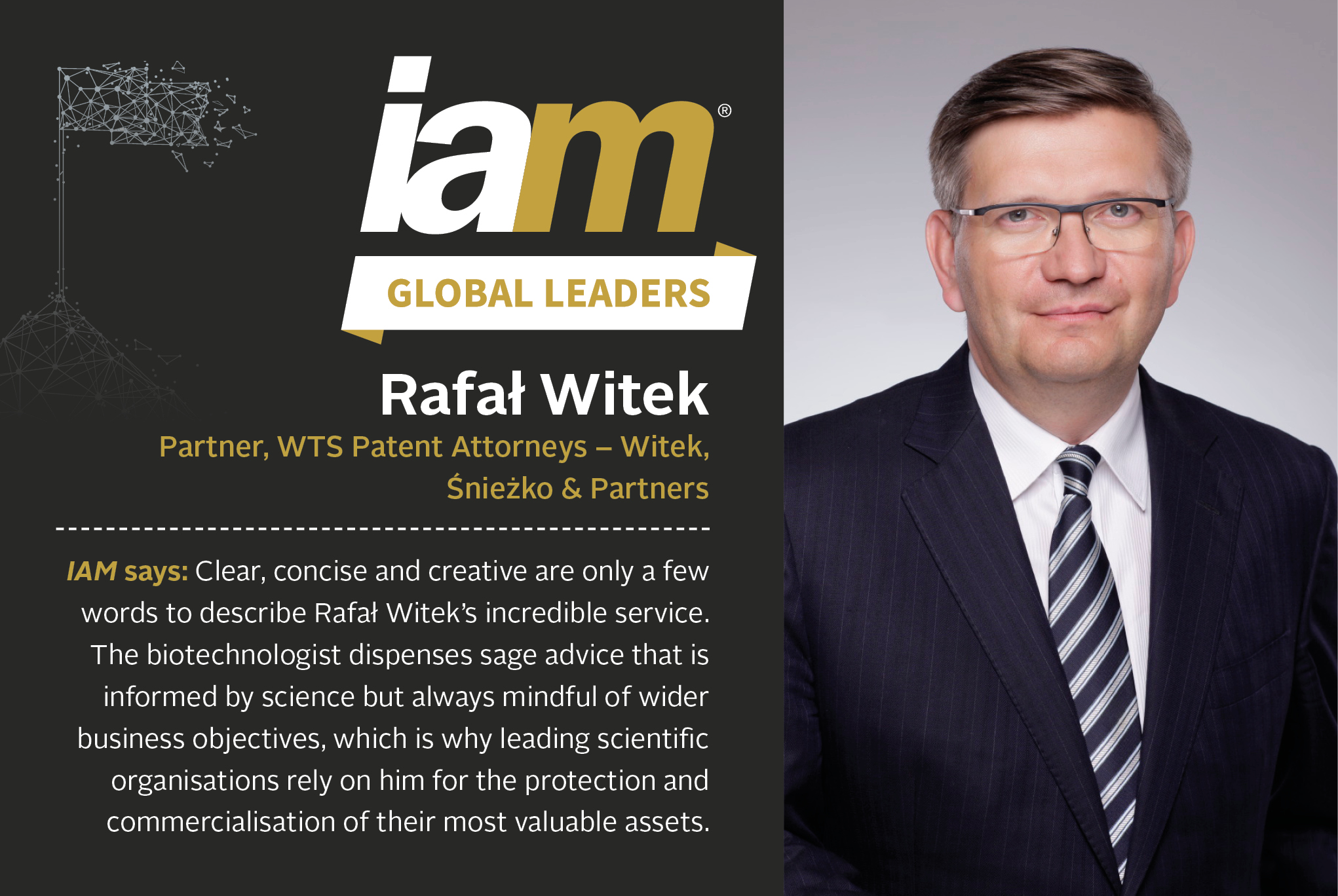Rafał Witek

Can you tell us about some of the highlights of your professional life so far and why they stand out?
Indeed, there have been several such moments that have influenced the development of my professional career. In hindsight, it is easier to identify them. The first was my initial exposure to patent law during my scholarship in Berlin and resignation from an academic career in favour of becoming a patent attorney. Poland’s accession to the European Union in 2004 and the related development of the free market in which IP protection has become very important has had a huge impact on the growth of our profession in Poland. From my private perspective, the decision made in 2002 to quit working in one of the leading patent offices in Warsaw and to create a completely new law firm with two other colleagues, specialising in patents in life sciences, was also very important. The combination of these two circumstances gave us, over the next 20 years, exceptionally favourable conditions for the development of our own company, and in my opinion, the opportunity to deal with more and more interesting matters, which are a source of professional satisfaction and motivation for the continuous development of our competences.
What are the key characteristics that clients look for in a top-level IP attorney?
Customers certainly expect high competences in the subject matter, commitment, availability and experience. Some of these can be confirmed by references, which is why reputation, which takes years to build, is so valuable in our profession. I know from experience that most of our clients come to us by recommendation and then, if they are satisfied, return with other cases. For some customers, especially in the public sector, price is still an important factor. However, under normal circumstances, especially in matters key value to the client, price does not play such important role any more. In such cases, the client chooses an IP attorney who gives them the greatest probability of success.
How do you measure the success of a world-class IP strategy?
We are not always able to actually assess the effectiveness of the selected IP strategy. An undeniable determinant will certainly be the valuation of IP assets included in the company, for example during a stock exchange debut. In the case of start-ups, an accurate IP strategy facilitates the acquisition of investors and stimulates the development of enterprise value. In the case of manufacturing companies, the measure of the accuracy of the selected patent strategy may be the number of blocked infringers or oppositions to the company’s patents filed by its competitors or market leaders.
What are the biggest challenges facing international clients looking to enforce their pharmaceutical and biotech patents in Poland?
Nowadays, as we have a specialised patent court in Poland, the main challenge in effective enforcement is the still insufficient experience of judges dealing with patent cases. From our perspective, a serious barrier to efficient enforcement is also the lack of people in the adjudicating panel with technical knowledge appropriate to the subject matter of a given case. Even the most experienced judge finds it difficult to assess the validity of arguments in a case that requires specific technical knowledge, for example, in the field of pharmaceuticals or biotechnology.
What emerging trends and technologies are having the biggest effect on the European biopharma patent landscape at present – and what should clients do to prepare?
In recent months we have seen an increased interest in anti-infective drugs, vaccines and tests to detect infections. I think that experiences such as the global pandemic have verified the plans of many investors and has increased interest in this area of technology. As all vaccines authorised in the European Union are mRNA-based, we expect to see the further development of RNA-based pharmaceuticals. From the patent perspective, this is a very interesting and relatively young field of technology. Accordingly, it is still possible to patent universal elements of RNA-based pharmaceutical products that can be used in many such products. Examples of such inventions are still valid patents relating to techniques commonly used to obtain RNA-based products or universal elements contained in mRNA-based products, such as mRNA 5’-end (CAP) analogues. The creation of IP pools collecting these types of patents could be quite a challenge for new companies trying to develop mRNA-based products.
The attempt to provide patent protection for medicinal products for use in personalised therapy, which, as a rule, do not have a fixed composition and structure, is still a considerable challenge. It seems that ensuring adequate patent protection for this type of technology is not possible without serious changes to European patent laws, especially with regard to the prohibition on patenting treatment methods. In all these new areas, however, clients should still take into account patent protection for their products and technologies as an important element of their own IP strategy when building their market position.
Rafał Witek
Partner [email protected]
Rafał Witek is a partner and co-founder of WTS Patent Attorneys – Witek, Śnieżko & Partners. He is a Polish and European patent attorney with a background in biotechnology, and wide ranging professional experience. His practice focuses on protection life sciences inventions, pharmaceutical patent litigation, technology transfer and IP due diligence. Mr Witek’s clients range from esteemed scientific organisations and biomedical start-ups, to multinational pharmaceutical and chemical companies.

